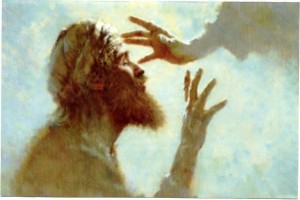Sermon Excerpt
This morning is all about blindness – the lifelong physical blindness of one man born blind and a bad case of temporary spiritual blindness in a group of religious folks.
Perhaps we should begin with what appears the easier form of blindness: the physical lack of sight. The man born blind has lived his entire life without being able to see his surroundings. If he had hopes that he might someday see, those had likely died off years ago.
Certainly he had never envisioned meeting Jesus, much less being touched and made whole by him. Clearly he must have been confused when he heard Jesus spitting on the ground beside him, perplexed when Jesus’ fingers covered his eyes with mud, and unsettled as he made his way to the nearby pool to wash it off. Surely he was amazed when this impromptu incident provided him with the gift of sight.
So . . . what about this seemingly simple story upset the religious folks? Why were they so set on disproving something that seems not only readily apparent, but also life-giving and wonderful? The answer is simple: tradition.
They were responding based on their understanding of how God worked in the world. It was assumed that anything less than wholeness – any physical disability at all – was evidence of sin. The question wasn’t if the blindness was a result of sin, but rather about the details of the sinning – speculation about who had sinned and what sort of sinning led to lifelong blindness. Given this perspective, Jesus’ intervention was unthinkable; it is an attempt to undo something God had done.
We may be tempted to dismiss this story and the theology of the religious characters in it as something only applicable to a long ago time and a faraway place. That simply isn’t possible because the idea that God punishes not only children for the sins of parents but entire communities for the sins of the people persists to this day.
Remember the times in your lifetime – event in the 21st century – when people who claim to be Christians stood up and spoke about how horrific events that claimed lives and did incredible damage to property were actually God at work judging those communities?
Remember . . . (read full manuscript)
So What?
In this passage blindness and sightedness are about belief and unbelief. The goal for those who follow the way of Jesus isn’t to attain 20/20 vision; the goal is to become well aware of our own spiritual blindness, especially our ongoing blind spots. Only when we accurately assess the condition of our spiritual vision can we open ourselves fully to hearing a Still Speaking God and seeing the possibilities that surround us.
- What have you committed to doing this Lent that will help you assess the condition of your spiritual vision?
- Consider praying “Lord I believe, help my unbelief” as a means of opening yourself to connecting with the divine even and perhaps especially in the areas that currently appear blurry or take the shape of unidentifiable images.
